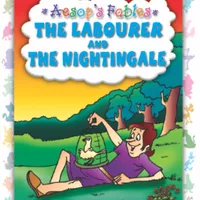The Labourer and the Nightingale
Der Hilfsarbeiter und die Nachtigall
El obrero y el ruiseñor
L'ouvrier et le rossignol
労働者とナイチンゲール
노동자와 나이팅게일
Robotnik i słowik
O operário e o rouxinol
Рабочий и соловей
Робітник і соловейко
劳动者与夜莺
勞工與夜鶯
A Labourer lay listening to a Nightingale's song throughout the summer night.
||||||||pendant|||
Một người lao động nằm nghe chim sơn ca hát suốt đêm hè.
So pleased was he with it that the next night he set a trap for it and captured it.
Il était si content de cela que la nuit suivante, il lui a tendu un piège et l'a capturée.
‘Now that I have caught thee,' he cried, ‘thou shalt always sing to me.'
‘Maintenant que je t'ai attrapée,' s'est-il écrié,‘tu chanteras toujours pour moi.'
“Bây giờ tôi đã bắt được em,” anh ta kêu lên, “ngươi sẽ luôn hát cho tôi nghe.”
‘We Nightingales never sing in a cage.' said the bird.
‘Nous, les Rossignols, ne chantons jamais dans une cage.' dit l'oiseau.
‘Then I'll eat thee.' said the Labourer.
‘I have always heard say that a nightingale on toast is dainty morsel.'
|||||||||||délicieux|
“Tôi luôn nghe nói rằng một con chim sơn ca trên bánh mì nướng là một miếng ăn rất ngon.”
‘Nay, kill me not,' said the Nightingale; ‘but let me free, and I'll tell thee three things far better worth than my poor body.' The Labourer let him loose, and he flew up to a branch of a tree and said: ‘Never believe a captive's promise; that's one thing.
||||||||||||||||||||||||||||libre||||||||||||||||||||
‘Non, ne me tue pas,' dit le Rossignol; ‘mais laisse-moi libre, et je te dirai trois choses bien plus précieuses que mon pauvre corps.' Le Laboureur le lâcha, et il s'envola vers une branche d'un arbre et dit : ‘Ne crois jamais à la promesse d'un captif ; c'est une chose.
'Không, đừng giết tôi,' Chim sơn ca nói; 'nhưng hãy để tôi tự do, và tôi sẽ nói với bạn ba điều còn giá trị hơn cơ thể tội nghiệp của tôi nhiều.' Người Lao động thả anh ta ra, anh ta bay lên một cành cây và nói: 'Đừng bao giờ tin lời hứa của kẻ bị giam cầm; đó là một điều
Then again: Keep what you have.
Ensuite encore : Garde ce que tu as.
Sau đó một lần nữa: Giữ những gì bạn có.
And third piece of advice is: Sorrow not over what is lost forever.' Then the song-bird flew away.
||||||tristesse||||||||||||
Et le troisième conseil est : Ne pleure pas sur ce qui est perdu pour toujours.' Puis l'oiseau chanteur s'envola.
Và lời khuyên thứ ba là: Đừng đau buồn vì những gì đã mất mãi mãi.” Thế là chim hót bay đi.

